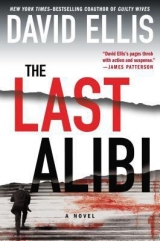
Текст книги "The Last Alibi"
Автор книги: David Ellis
Жанры:
Триллеры
,сообщить о нарушении
Текущая страница: 25 (всего у книги 31 страниц)
92.
Shauna
Bradley John begins the substance of his direct examination with the videotaped interrogation, Jason’s lies to Detective Cromartie about his relationship with Alexa.
“It was stupid of me to lie about that,” Jason says. “But I was trying to protect her. It was—obviously, from everything we’ve seen here—a very difficult time for Alexa after our breakup. I would think she’d find it embarrassing, humiliating, really, for others to know how she behaved afterward. I felt like that was between Alexa and me, and nobody else needed to know. I felt bad enough about our breakup already and I thought I owed her some respect.”
“But Jason, this was a murder investigation.”
“I know. I understand. But I knew I didn’t kill her, so I didn’t see how the status of our relationship really mattered in terms of catching the killer. I mean, what I did was wrong, but I only did it out of respect for Alexa. I certainly wasn’t covering up anything.”
“Jason, you worked as a prosecutor here in this county, did you not?”
“Over eight years,” he says. “And then I’ve been in private practice for about three years.”
“In that time, on either side of the criminal justice system, have you seen occasions when phone records, like the ones we’ve seen in this case, were used by law enforcement to help solve crimes?”
“Of course. So many times, I’ve lost count.”
“And what about searching Internet servers for e-mail correspondence?”
“It’s a routine part of investigations, especially more recently, as Internet usage and e-mail have skyrocketed.”
“Is there any reason why this case would be any different in that regard?”
“No, not at all. And I guess that’s the point I’m trying to make. If I killed Alexa and was trying to cover it up, why would I lie about something that I knew the police would discover? Why would I say our relationship was just fine when I knew that she’d called me hundreds of times after the breakup, phone calls that I knew were on some provider’s records ready to be subpoenaed? When I knew there were e-mails out there that showed that our relationship had ended, and ended badly? I mean, if I’m a diabolical killer who carried out this crime and tried to cover it up, I’m the dumbest diabolical criminal who ever lived.” Jason opens his hands. “But I wasn’t thinking of any of that, because I wasn’t covering up any crime. I was just trying to show Alexa some respect.”
Good. That was almost verbatim how Bradley and Jason practiced it. I think it sounds reasonable, convincing. And if I find it convincing—knowing, as I do, that Jason had an ulterior motive for what he told Detective Cromartie in that interrogation—the jury might buy it, too.
Roger Ogren stands as Jason nears the end of his speech. “Your Honor, I’m trying to be patient, but I have to object to this speech and move to strike. This has moved from a direct examination to a summation, a monologue.”
The judge nods. “I’m going to overrule, Mr. Ogren. I understand your point, but this is the defendant testifying.”
That’s what Jason predicted the judge would say. Criminal defendants get more leeway when testifying in their own defense, with their liberty at stake and the Bill of Rights waving like the Stars and Stripes at its most magisterial.
“However, Mr. John,” the judge adds, “let’s resume the Q-and-A, please.”
“Thank you, Your Honor.” Bradley comes from a school where you thank the judge for everything she says to you, even if she just called you an idiot and held you in contempt.
“Next, Jason, let’s talk about one of your least favorite subjects: OxyContin.”
Jason smiles and grimaces at the same time. He takes the jury through the highlights, the knee surgery, the recuperation, ultimately the addiction. “You don’t admit it to yourself,” Jason says. “It’s happening right in front of your eyes, and a part of you knows it, but you make excuses to everyone around you and suddenly you’re believing those same excuses.”
Bradley nods. “Jason, did there come a time when you finally admitted the addiction to yourself?”
“Yes. It was the Friday before Alexa died.”
“Friday, July twenty-sixth.”
“Correct.”
“And how is it that you remember that date so clearly?”
“Because, for one thing, it was the day that Alexa and I broke up.”
“Can you explain how the one has anything to do with the other?”
Oh, does Roger Ogren want to object. He knows, I think, what Jason’s going to say, and he doesn’t want his victim getting trashed, an age-old tactic of the defense bar. But he’s also built his entire case around this relationship, this catastrophic breakup, and if he jumps up and keeps the jury from hearing something directly germane to that topic, he looks like he’s hiding something, like he’s afraid of some fact. That’s how I’d feel, at least, if it were me.
“I think, by the time it had reached that point, it was obvious to everyone close to me that I had a problem,” Jason says. “I’d lost a lot of weight, I was losing focus, I was moody all the time, I was really a completely different person. I think it was obvious to Alexa, too. It had to be. But she made excuses for me as much as I was making them for myself. In rehab, they call that person an enabler. And if I was going to beat this addiction, I couldn’t be with an enabler. I needed to break free of the drugs and break free of her. I needed people surrounding me who would say to me, Don’t take drugs, not, Here, honey, have some more.”
“You’re not blaming Alexa for your addiction?”
“God, no. The blame for my addiction falls on me and only me. All I’m saying is, I had to get out from under that spell. I had to win that fight or I’d lose my life. It really came down to that for me. It was going to kill me, sooner or later. And I needed people around me who would help me fight it. Alexa, for whatever reason, and she had a good heart deep down, but . . .” Jason shakes his head, like he’s reliving a sad memory. “She always told me it was okay to take the pills, it was okay to want to feel good. I needed someone yelling ‘Stop!’ at the top of their lungs.”
Bradley allows for an appropriate pause before he moves on.
“In any event, Jason, you and Alexa did break up in the days preceding her death.”
“Yes, we did. The previous Friday.”
“Friday, July twenty-sixth?”
“I guess that’s the date,” says Jason.
“I’d like to refer you to People’s Eighteen, Jason.” Bradley references the chart on the screen, previously set up. “This is a summary chart of Call Detail Records from that date, is that correct?”
“Yes,” he says. “You can see that on the CDR for that Friday, the phone calls begin happening in earnest at 2:47 in the afternoon. You can work back from that time. I went to her house at some time around one or so, give or take. I told her our relationship had to end, that I was going to get clean, and I wasn’t going to change my mind. She started calling me within the hour, and as you can see . . . she didn’t stop.”
“Did these calls go into voice mail, Jason? Or did you answer them and speak with her?”
“Mostly voice mail. I talked to her a couple of times. Not on Friday, I don’t think. But Saturday, I believe I answered one of the calls in the afternoon. I can’t be sure of which one.”
Bradley references the Call Detail Records for that Saturday. Like Friday, every call was less than a minute in duration, thus receiving the rounded-up 1 in the duration column.
“A short conversation, I take it? Less than a minute?”
“Very short,” Jason says. “I don’t know if you’ve ever had a bad breakup,” he says, ostensibly to Bradley but really to the jurors. “Whether you’re the one who breaks up or the one who got dumped, it’s an awful thing. So . . . on the one hand, I had to be firm, I had to let her know that we wouldn’t be getting back together. My life depended on that, I thought. But on the other hand, I’m human. I felt terrible about how things went with us. I knew she was hurting. So I just wanted to answer a call or two, not to give her false hope, but to let her know that I was sorry. Maybe give her a tiny pep talk, for lack of a better word. You know, ‘It will all work out, it will take some time but you’ll be fine,’ that kind of thing.”
“I see,” says Bradley. “Now, Jason, that Friday, and the next day, Saturday, and all of those days, what were you doing?”
“I was trying to wean myself off the painkillers,” he says. “I was trying to quit. It was . . . it was hell, actually. It’s physically painful, it’s mentally tortuous—I vomited, I cramped up badly, my skin burned—but I was dealing with it.”
“And were you dealing with this alone, or did you have any help?”
“Alone,” Jason answers. His eyes remain fixed on Bradley, deliberately avoiding mine. This was the subject of a heated debate, to say the least, Jason wanting to remove me entirely from the equation, pretending that I wasn’t with him during those initial days of his withdrawal, not wanting to risk the possibility that I might become a witness. You can’t be my lawyer and a witness, he said to me, stating the obvious. I need you as my lawyer.
That was his stated reason, anyway. We both knew, I think, that his reasoning ran deeper. He didn’t want to put me in the position to have to testify under oath. He didn’t want to put me in a position where I would have to lie.
Or where I would tell the truth.
93.
Shauna
“Jason,” says Bradley John, “I’d like to talk about another exhibit the prosecution admitted into evidence.”
Bradley puts on the screen the e-mail that Alexa sent, with the attached letter to the Board of Attorney Discipline. “Did you open and read this e-mail, Jason?”
“I did. Something like ten o’clock on Tuesday morning.”
“This is Tuesday, the thirtieth of July? The day Alexa died?”
“Correct,” Jason says.
Bradley puts the letter itself on the screen. “Did you read the letter?”
“I did, yes.” That’s already been established by the prosecution, anyway.
“What was your reaction, Jason?”
“More than anything, I was sad,” he answers. “It was spiteful. It wasn’t like Alexa to do something like that.”
Roger Ogren is maintaining appropriate courtroom demeanor, the stone face, but I see his lips twist up just a little. This is one of those times when you realize a trial is just a show, a performance, a competition, not the reflection of the truth it’s supposed to be. Roger Ogren knows about Alexa’s history, the doctor in Ohio and the restraining order. He fought like hell, successfully in the end, to keep any reference to it away from the jury. So the jury will never hear it. But Ogren himself, he knows all about it. And he knows we know, of course. And so Jason telling this jury that it “wasn’t like Alexa to do something like that” is, to the lawyers in the room, pure bullshit. An untrue statement taken from an artifice constructed by Roger Ogren and, ultimately, the judge, who agreed with his argument and kept Alexa’s past off-limits.
It is the first time during Jason’s testimony that Roger Ogren is certain that Jason is lying. And it has changed how he views him. Whether that will make a difference to us is anyone’s guess.
“Beyond that,” Jason goes on, “what she wrote was basically true. I’m not aware of any case I handled during that time period where a client of mine suffered as a result of my problem. But it’s no doubt true that I had that problem.”
“What did you do, Jason, after reading that e-mail and the attachment?”
“I went to see Alexa,” he says.
Roger Ogren, in spite of himself, rifles to attention. This would be news to him.
“When did that happen?” asks Bradley.
“Not long after I read the e-mail,” Jason says. “I packed up Alexa’s clothes and toiletries, whatever belonged to Alexa that was in my house, and then I drove them over to her house. I needed to return those things, anyway. And I wanted to talk to her.”
“Did you? Talk to her, I mean?”
“Yes. I drove to her house. I brought in the suitcases. We sat in her living room and talked. I told her that she could send that letter if she wanted to, that it was basically true and that I wouldn’t deny the charges.”
“What happened next?”
“She told me she’d never send that letter, that she’d never do anything to hurt me.”
“Objection, hearsay,” says Roger Ogren.
Bradley says to the judge, “It’s not offered for the truth of the matter asserted, Your Honor. Only to show the effect on Mr. Kolarich’s state of mind. This is all about motive, from the prosecution’s standpoint. They want to paint this picture of a man threatened, and we are offering this to show that he didn’t feel that way at all.”
“This is offered precisely for the truth of the matter asserted, made by someone who isn’t here to contradict this so-called truth,” Ogren snaps back.
The judge holds up her hand. “The objection is overruled.”
“Your Honor,” Ogren says, “I’d request this testimony be held in camera first so we can address these hearsay problems before they are simply tossed out in open court—”
“What hearsay problem? That objection was overruled,” Bradley says, his competitive juices flowing. He’d be better off shutting up. When you’re ahead, shut up. A young lawyer’s mistake. Some of the best decisions an attorney makes are when she keeps her mouth closed.
“We’re not hearing this testimony twice, Mr. Ogren,” the judge says. “And the two of you, I’m going to say this once: You do not talk over each other and you don’t talk at all unless I indicate that I want to hear from you. Is that clear?”
“Yes, Your Honor,” says Ogren, defeated, and says Bradley, satisfied.
“Jason,” says Bradley, “when Alexa told you she was never going to send that letter, and that she’d never do anything to hurt you, did you believe her?”
Borrowing a page from Ogren’s playbook, earlier in the trial, repeating helpful testimony in the form of a question. Ogren can hardly object.
“Of course I did. I was surprised she even sent that e-mail in the first place. Like I said, it really wasn’t like her to do something mean-spirited like that. So, I’m sorry—the answer to your question is, yes. I believed she would never send that letter to the disciplinary board.”
“And what happened next, Jason?”
He lets out a breath, a small courtroom victory accomplished. “Then I went back home, and I continued my recovery. I remember Tuesday as being a rough day, but honestly they all were.”
“You were home all day?”
This is a question the police and prosecutors have wanted answered since July thirtieth, when they found Alexa Himmel’s body. Where was Jason until sometime just after midnight, when he claims that he first returned home and found Alexa dead?
“No, I didn’t stay home the whole day. I went to the beach later that day. Can’t be sure when. Maybe—maybe mid-afternoon? It was a nice day. I sat on the beach and watched the waves. I did some power-walking, too. The adrenaline helped. It was kind of like a substitute for the drug.”
It’s a bit unsettling how well Jason can lie. He never went to the beach that day. He was lying on the couch, alternating between suffering and sleep, the entire afternoon and evening. He couldn’t even hold down the peanut butter toast I made him.
“You stayed at the beach for how long, Jason?”
“I can’t be sure. Until it got dark.”
“Do you recall, during that time in late July, when it got dark?”
“Oh, around eight.”
Getting close to that 8:16 P.M. phone call to his house. The call from Alexa, that sent him scurrying over to her place. If he’d never answered the phone, if he’d refused her pleas, if he’d just stayed home with me—
“And I stayed there in the dark for a while, too,” Jason goes on. “Sometimes that’s the best time to be by the lake. So maybe eight-thirty, maybe nine. I mean, it could have been nine-thirty, too.”
“And then what did you do?”
“I drove around,” he says. “All over, I guess. Everywhere and nowhere. I wasn’t traveling to a destination.”
“That sounds . . . unusual,” Bradley says, faux confusion.
“Not if you consider why I was doing it,” he says. “I wasn’t going anywhere. I just needed time to pass. You have to understand, what you’re doing when you’re in withdrawal, when you get down to it, is simply killing time. Every minute you’re clean is a victory, another minute closer to not needing pills anymore. They’re horrible minutes, but necessary. So I was doing anything to distract myself, trying to ignore the cravings, trying to hold out. If watching a children’s cartoon would pass the time effectively, I’d do it. If suspending myself upside down would help, I’d do that. All I was trying to do was get my body and my mind accustomed to not having OxyContin.”
“But the car?”
“Sure, the car. I never once took Oxy while in my car. I’d take it at home or in my office at work. That’s where the maximum temptation was. I was better when I was places I didn’t associate with the drug. Like the beach. Or driving, concentrating on the rules of the road and the speed limit and staying in my lane and playing music really loud and all of those things. The more I had to focus on that, the less I was focusing on Oxy.”
Good, I say to myself. He handled that well.
“When did you get home?” Bradley asks.
“It was sometime after midnight.”
“And what happened when you got home?”
“When I got home,” Jason says, “I went upstairs. And there was Alexa. Lying on my living room floor.”
94.
Jason
“I don’t remember exactly when I called the police,” I say in response to a question from Bradley. “But it would have been very shortly after I found Alexa dead.”
Bradley takes a drink of water, maybe for dramatic effect, but I think because his nerves are giving him dry mouth. Funny, I never had that problem myself—my mind and body seem to function best in situations like this, under pressure—but it was a problem that plagued me through my addiction.
He’s done a nice job with me. I’ll have to remember to tell him so. If this thing goes south for me, he’ll take it hard. Not as hard as Shauna, but hard.
“Jason, did you call 911 on your cell phone or on your landline?”
“Landline telephone,” I say.
“How is it that this detail sticks in your mind?”
“Because I remember the light was blinking on my machine. I had a voice mail. After I called 911, I sort of sat there, numb. And I pushed a button and listened to the voice mail.”
“Was this a voice mail from 8:16 that evening?”
“I don’t remember. I mean, I didn’t check the time. I just pressed the button to retrieve the message and I listened to it.”
Since I’m making up this entire business about the voice mail, it is tempting to say, Yeah! I remember very clearly that the voice mail had come at 8:16 P.M., and the message was more than one minute but less than two! But who remembers shit like that? So I don’t want to overplay my hand here. If you’re going to lie, lie about stuff that really matters, and play it safe on less important details, so it doesn’t look like you’re lying.
I am, after all, the son of a con artist.
“And what was the message?”
“It was from Alexa,” I say. “It was a long message. She was talking about wanting to get back together, she was watching a love story on television about star-crossed lovers and she wondered if maybe there was a chance for us, and she was going to come by my house if that was okay.” I pinch the bridge of my nose and pause. Respectful silence. Pained silence. I look back up at Bradley and let out air. “Obviously . . . she decided to come by.”
Bradley puts on the screen the Call Detail Records for that day, showing the 8:16 P.M. phone call with the number 2 in the column for duration.
“Was the voice mail more than one minute but less than two?”
“Oh, God.” I sigh. “Bradley, the truth is, I have no idea how long it was. I mean, I had just found Alexa . . .” I swallow hard and pause, summoning emotion. I can’t fake-cry. I hardly cry for real, so the concept of faking it is foreign to me. But I bring my fist to my mouth and bow my head and pause.
“I’d just found Alexa . . . lying there,” I go on, “and now I’m hearing her voice on the phone. It was . . . I mean, it was crazy, it was . . . like a dream or something.” I take a long, hard breath. “If you told me it was ninety seconds, I’d believe you. If you told me it was ninety minutes, I might believe you, to be honest.”
“And did you keep that message on the phone, Jason?”
“I wish I had,” I say.
“But you didn’t?”
Everyone knows I didn’t. The police checked my voice mail and it was empty. My phone company has no retention policy on voice mails. If the user deletes the voice mail, it’s gone with the wind. They don’t even know if I had a voice mail at 8:16 that evening. All the phone company knows is that something—my voice mail or a human being—answered Alexa’s call, initiated the connection with her cell phone, at 8:16 P.M.
“Bradley—sorry, Mr. John,” I say, “I honestly don’t remember deleting that phone message, but I’m sure I did. It’s like—I do it by rote. I hear a message on my home phone and then I delete it. It’s automatic for me.”
It’s automatic for most people, which is why, again, I’m not overplaying my hand here and claiming that I specifically recall pressing 7 and erasing her message. My ex-girlfriend is dead, I’ve just called 911, but I remember deleting a voice mail?
It’s little things that separate good lies from bad. Maybe I should teach a class, or write a how-to manual. Lessons from My Father.
“Jason, let’s talk about whether Alexa had a key to your house. Do you recall portions of the videotaped police interview where that subject was discussed?”
“I do.”
We’re going here next because Shauna considers this subject a low point for us. She decided it was best to sandwich this topic between more favorable matters.
“Did Alexa Himmel have a key to your house?”
“Yes, she did. Of course she did. Until we broke up, she practically lived with me.”
“The testimony we’ve heard,” says Bradley, “is that the police could find no such key on Alexa or anywhere else in your house.”
“I heard that, too. I don’t know what to tell you. I really don’t. I never got the key back from her. She still had it.”
“Did she typically keep it on her key chain?”
“Oh, boy.” I blow out air. “I really can’t say for sure whether she had it on her regular key chain or separate. I’m sorry. I really don’t know. Whenever we were together, I’d open the door. It was only when she was there by herself that she’d have to use the key. So I’m not sure I ever even saw where she kept the key or what she put it on.”
That sounds pretty good, I think. Better to do what I just did—throw up your hands, chalk it up to one of those things that probably has an obvious explanation, but you can’t think of it—than to have some elaborate explanation that checks every box. Again, if I’m a devious liar, why wouldn’t I come up with some carefully crafted explanation?
“Now, Jason, I’d like to turn to our final subject,” says Bradley. “I’d like to talk about this person you mentioned to Detective Cromartie as the possible killer. I’d like to talk about the person you called Jim.”








